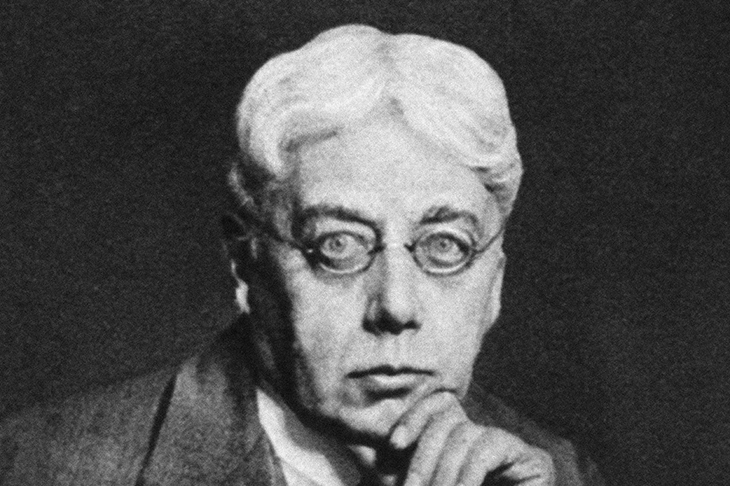Edward Garnett, radical, pacifist, freethinker, Russophile man of letters, was from the 1890s onwards for many years the pre-eminent fixer of English literature. D.H. Lawrence’s widow Frieda hailed him as ‘the midwife’ of Lawrence’s ‘genius’. And so he was; while he also nurtured Joseph Conrad, T.E. Lawrence, Edward Thomas, Liam O’Flaherty, H.E. Bates and Henry Green. He presided as ‘reader’ over the shoals of expectant manuscripts piling up daily at the publishers — starting out at Fisher Unwin, doing the business for Heinemann and Duckworth, putting in long stints at Dent and ending up at Cape.
Jonathan Cape headhunted Garnett for his new firm in 1921 as ‘the best reader’ in the land. Garnett was by then famous as the main man with an eye and a nose for literary promise and — even more valuable for publishers — for promise’s opposite. ‘Hurl away, ‘ he’d scribble on duds; ‘Reject… sarcastically.’ But his ‘cubs’, as they came to be known, got the fullest care and attention: copious badgering, cutting, rewriting, and unforgiving rudeness about characters, ideas, irrealisms — and endings.
Above all, endings. He pedgilled away — D.H. Lawrence’s lovely Midlandism for Garnett’s unremitting diligence, his selfless slaving over the heaps of manuscript — and all for rather scanty financial reward (the unremunerative nature of this life as super-hack is a constant theme of Helen Smith’s caring inspections). He laboured day and night for the mere good of the literary cause. It was practical criticism in every sense — literary fostering backed by cash handouts and bed and board, digging out funding for needy writers.
He became, in effect, one writer’s agent, another writer’s manager; went out of his way to secure (his word) paid work for his protégés — short-story outlets, reviewing and so forth. He would enthusiastically review works that he had nudged into life (with nary a thought about maybe declaring an interest). He found homes elsewhere for writers who his current employers wouldn’t take — Jean Rhys, for instance, at Chatto. Garnett knew the ropes, cannily played the scene and was in fact a kind literary mafia boss. Naomi Mitchison called him a literary Godfather — and it’s hard not to take that also in the gangland sense.
Not every cub enjoyed being ‘barbered up’, in D.H. Lawrence’s phrase: given the critical short-back-and-sides. But Garnett prided himself on the rightness of his hard-mouthings, and kept on dishing them out. (‘I write what I feel on impulse, without bothering ahead about the effect.’) He seems never to have doubted his much rehearsed lines about what made the literary goods: realism, detail, truth to ‘life’ and to the writer’s actual experience, and above all closeness to the great Russians (which his estranged wife Constance Garnett notably translated). Russophilia was the key. In Constance’s case, that extended to loving the notorious exiled anarchist assassin Sergei Stepniak. Garnett never went that far. But again and again he thrusts his adoptees into the arms of Dostoevsky, Chekhov and above all Turgenev. They must be imitated.
Conrad too, Garnett’s first great find — prickly Polish Conrad, of course, who was mightily irked to hear Garnett publicly insisting that his fiction had ‘Slavic’ virtues. Godfather Garnett never passed up his right to describe and name and identify as he chose, even if it meant boneheadedly ignoring Conrad’s pervasive Russophobia like that.
Garnett’s critical ideés were fixed and adamant. In many ways the keenest eye in town for talent had its blind spots, not least when it came to high modernism. His critical partiality is witnessed by his preference for the Bennett-Wells-Galsworthy triumvirate that Virginia Woolf lampooned as the materialists whom modernity must leave behind. The manuscript of Joyce’s A Portrait of the Artist as a Young Man should be returned as ‘curious’ and ‘unconventional’. Cape should spurn Beckett’s Dream of Fair to Middling Women: ‘eccentric in language and full of disgustingly affected passages’. The fictions that became The Rainbow and Women in Love needed heavy lifting — which Lawrence rejected. One of the most important modernist manifestoes for fiction, Lawrence’s rejection of the ‘old stable ego of the character’ and the moral schematisings of the Russians (‘dull, old, dead’), starts life in a letter protesting Garnett’s customary negations. This cub had had enough of the Godfather’s settled attentions.
Such resistances, when they came, never put Garnett off. He pedgilled on as a literary midwife till he died in his sixties in 1937, having successfully cast swaths of British writing in his own image. It’s characteristic of that masterful Garnettising that his bodging cut-down version of Sons and Lovers — blurring and occluding Lawrence’s wonderful provincial realism and religiosity — was the only one in existence from 1913 to 1992.
The strong-arming work of Edward Garnett is the bright and also dark star of Helen Smith’s lovely, telling biography. It’s a sort of Conrad novel manqué — pleasingly peopled by Russian anarchists and exiles, Fabians, pacifists, vegetarians and free-ish lovers, the keen Russophiliacs of the culture, with droves of writers, critics, and publishers all contentiously scrabbling away, all got up by Godfather Garnett.






Comments